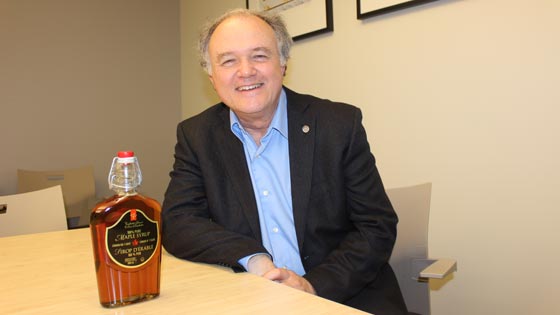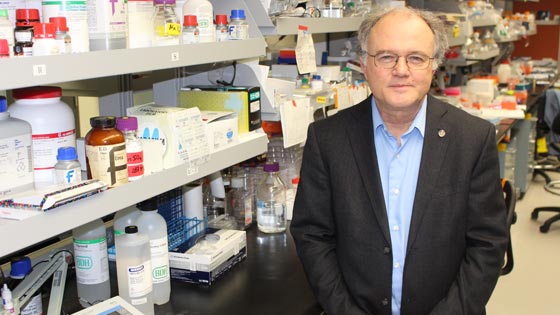
A recent study conducted by Krembil Research Institute Director Dr. Donald Weaver suggests that an extract found in maple syrup has the potential to protect against Alzheimer's disease. (Photo: UHN News)
Maple syrup is proving to be more than just a tasty way to start the day. It is also showing the potential to protect against Alzheimer's disease.
Research conducted by Dr. Donald Weaver, Director at the Krembil Research Institute, found an extract in the Canadian breakfast staple could help prevent the misfolding and clumping of two types of proteins found in brain cells that are associated with Alzheimer's.
The research sparked worldwide attention after Dr. Weaver discussed the findings with fellow scientists at a gathering of the American Chemical Society in San Diego earlier this month. His talk has resulted in a tidal wave of interview requests and media attention.
Dr. Weaver sat down with UHN News to discuss his research findings and the level of interest they created.
When did you come up with the idea of studying maple syrup?
People think about the health benefits of red wine because it contains resveratrol and they think about curcumin because it is found in curries. Those things have the ability to prevent the two proteins implicated in Alzheimer's disease, beta amyloid and tau peptide, from clumping and misfolding.
So we went looking for other polyphenols that we hoped would have the capacity to be better than resveratrol and curcumin.
How does maple syrup fit into this situation?
One of the things that differentiates maple syrup polyphenols from the polyphenols found in red wine, or grapes or blueberries, is that the sap is boiled for hours, which creates different polyphenols. Maple syrup has a range of polyphenols not found in other materials just because it's processed and handled differently.
So boiling the sap changes the properties?
Yes, if you look at the polyphenols in sap and you look at the polyphenols in maple syrup, they are two different things. So, you have done a whole bunch of synthetic chemistry just by boiling it. We thought this would give us access to some interesting compounds.
How was this research funded?
This research is unfunded. In fact, I didn't want to put it on any of my grants because I don't have grants to do it. So, I took $40 out of my wallet and handed it to the technician in the lab and said 'Go buy some maple syrup.'
This was driven by your own curiosity about the properties of maple syrup?
Yes. This is a neat project. I remember at the time the technician and I were joking, 'Well, you can't get much more Canadian than this, eh?'

Dr. Weaver is a neurologist and the Director of the Krembil Research Institute. His lab at Krembil studies Alzheimer’s disease . (Photo: UHN News)
Is this ongoing research or is it something that you've tabled for the time being?
We haven't worked on this for months. We did the research, wrote the paper, got it published, but it's not funded. The next steps are going to be expensive.
Would you like to continue to pursue this, if the funding is available?
Yes, if someone were to fund this work, I would be happy to continue. I'd be looking at maple syrup, I'd be looking at birch syrup. It's a natural product.
Were you surprised by the level of media interest in your research?
Yes, this was a side project for us and I wasn't expecting it to get any media attention at all. The paper had been sitting out there for months and nobody paid any attention to it.
Have you had this level of interest about research in your lab before?
Certainly we've never had this degree of interest in any one of our projects.
My lab is a chemistry lab. We make drugs. We've had interest on other topics in the past, but the hardcore, mainstream research that the lab receives funding for is rarely covered because it can be perceived as dull work as we try to come up with a drug for Alzheimer's disease.
So do you like maple syrup?
Oh God, yes, I love maple syrup. It's great. When I was a kid, and when my kids were young, I used to take them to the maple syrup bush.
I don't take it for health benefits, but I do love it.
